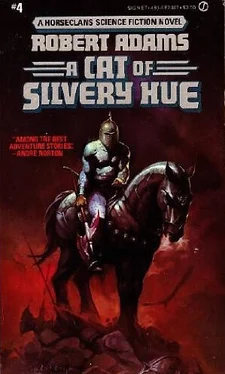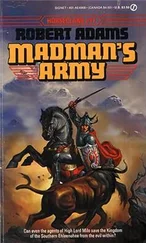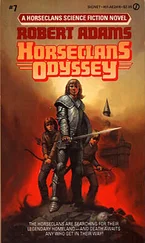Leathern bellows creaked and their huffs sent masses of brilliant sparks soaring up from the forge fires of farrier and smith, cadenced hammerstrokes ringing on horseshoe and blade. A trio of men skilled at fletching sat with their pots of evil-smelling fish glue and sacks of feathers and sharp little knives, haggling the charge with fellow archers even while their skilled fingers scurried about their tasks. Close by, large iron pots simmered, and in their steam—scented with sorrel leaves and resin—other archers straightened shafts.
There were no classes tonight, however. The weapons masters hustled about the camp, inspecting blades and spears, axes and armor and darts, chivvying the owners of many to the honing circle, some twoscore men squatting about the largest fire, their voices raised in an endless ballad, sung in cadence with the measured scrape of whetstones. The men with the best voices or memories took turns as lead singer, while the rest roared out the catchlines and choruses, and circulating skins of barely watered wine kept throats from drying.
“A wager, a wager, a wager I’ll lay you, I’ll lay you my gold to your brass”
And “TO YOUR BRASS!” swelled from the men.
That no Undying King could tell of braver deeds than were done at the Burk of Pehnduhgast.”
“THAT NO UNDYING KING COULD TELL OF BRAVER DEEDS THAN WERE DONE AT THE BURK OF PEHNDUHGAST. HONE YOUR STEEL!” came the chorus.
Humming the tune of the old familiar song, mustachioed Gilbuht nodded at the ever-expanding circle, saying, “How bides your steel, Brother Djaikuhb? My Uncle Sharptooth, here”—he slapped his scabbard—“might well do with a taste, of oil and stone.”
Space was made for the brothers in the circle, and when they had bared and kissed their steel, a grizzled, one-eared weapons master strode over, gave them stones from the bag slung on his shoulder, then squatted and examined their swordblades, suggesting where on the edges their efforts be concentrated. Before he went on about his circuit, he checked out their dirks, as well, and their bootknives. He knew who they were, as did all around the fire, but he showed them no deference, for in such a gathering, on such a night, Freefighters recognized no lines or barriers of rank and caste. All were comrades-in-arms, Brothers of the Sword, some of whom must surely die tomorrow.
Beside Gilbuht knelt a handsome, black-haired sergeant standard-bearer, his clear, tenor voice leading a verse, while his well-formed hands placed the finishing touches on the edges of a new-looking broadsword bearing a distinguished hallmark.
He mindspoke his brother, “Djaik, look you at the sergeant’s blade. Is it not a Slohn?” The House of Slohn had produced some of the best blades in the Kingdom of Pitzburk for three hundred years and more.
“Aye,” beamed the younger brother. “And a top-quality one at that. Look, it has not only the Slohn Foxhead but the personal device of the mastersmith, as well. Yon steel probably cost as much or more than a full-trained warhorse. No wonder he lavishes such care on it.”
Geros licked the oil from his lips—he had taken to kissing his blade, despite the fact that he was no Brother of the Sword, because be truly loved the splendid, well-balanced gift of Thoheeks Bill He had politely declined princely offers from both Freefighter comrades and nobles; he wore the sword with pride, caring for it as tenderly as he did for his trusty mare, Ahnah. And he had drilled and practiced until the wire-wound hilt was one with his hand and the three feet of blade a mere extension of his arm.
Captain Raikuh—and many of his old comrades attested that the uncanny accuracy of his predictions bordered upon second sight—had taken to treating the standard sergeant as an equal and, one night in his cups, had assured him that, while he never would be truly wealthy, he would die honored and respected, castellan of a high nobleman’s burk, with a minor title to leave his eldest son. It all sounded quite fantastic to Geros, but then, if this time last year anyone had told him that twelve moons would see him—quiet, gentle, unassuming Geros Lahvoheetos, son of a mere majordomo, bodyservant to a minor noble—riding to war in the company of hardbitten professional fighters, wearing the costly gift of a thoheeks, bearing a widely acknowledged reputation for valor and arms skills, he would have branded that person mad.
He had laid aside his sword and was about to start on his dirkblade when he realized that the young brother of his new lord was trying to mindspeak him.
Leaning closer and smiling, he spoke courteously, aloud. “Your pardon, young sir, but my mindspeak is a chancy thing, at best, which much pains sweet Ahnah, my good mare. What would you of me, noble sir? May I help with your good steel? I own some small skill.”
At this, a scar-faced Nyahgrahee seated on Djaikuhb’s left snorted a laugh. “Don’t let our good sergeant’s soft voice and girlish modesty fool you, friends. His ‘small skill’ is such that Old Pyk over there made him third-class weapons master. An’ your own noble brother, the duke, noted his guts in the big ambush we fought on the march and give him that sword what half the gentry in ten duchies done tried to buy off him, and give the troop half a pipe of damn good wine to drink to him in—and damn if we didn’, too.”
Gilbuht Morguhn laughed then and slapped his thigh. “Then you can be none other but Geros the spearman. Our lord brother spoke of you on the ride up from Morguhnpolis. And that answers the question I would have asked. Damned few Freefighters carry steel so fine.”
Added Djaikuhb, “And I’ve seen many Sword Brothers who did not treat their steel with such reverence.”
Geros answered with another of his shy, gentle smiles, “I am not of your brotherhood, young sirs. I but value your noble brother’s generous gift. It … it is a true work of art and I try to treat it with the respect which such a masterpiece deserves.”
“Y’see, friends,” grinned the Nyahgrahee, “our Sergeant Geros be a bit queer in the head, treatin’ a sword better’n he does his pore horse. But for all o’ it, he be a stout blade to have at your side, an’ ain’t no man in this here troop would gainsay me thet!”
Djaikuhb nodded once, grave-faced. “Comrade Geros, I, too, worship Steel, not simply for its godhood, but for its inherent strength and beauty, as your words proclaim you do. A man such as you, a right-thinking fighter, should long since have been of the Sacred Brotherhood.” Waiting for a pause in the singing, he raised his voice. “How many true Sword Brothers do we number, comrades?”
Perhaps a score and a half hands went up about the circle, and he went on, “I be Djaikuhb Morguhn, Full Brother of the Sixth Order, Noble Lodge of the Kingdom of Pitzburk. I propose for membership in your local lodge that valorous warrior, Geros the spearman. Who will bare steel to oppose this membership?”
Captain Raikuh arose from his place in the circle. “Noble brother, I be Pawl Raikuh, commander of Duke Bili’s troops and Master of the Freefighter Lodge of the Duchy of Morguhn.” Then he bespoke all, saying, “Let all non-brothers, saving only the proposed brother, disperse. Brothers, let us tighten the circle and converse on this matter.”
An hour before dawn, Aldora’s maidservant wakened her. She and Bili arose, washed, broke fast on a bit of bread dipped in strong wine then helped each other to arm, and wended their way to the pavilion of the High Lord. There they separated, Aldora riding off to the cavalry camp, Bili remaining with Milo to accompany his sovereign at the head of the assaulting infantry.
No words were spoken or beamed at the lovers’ parting, none were needed, for their straining, striving, pleasure-racked bodies had said all that was needful in the night now dying. As for Milo, he allowed himself a chuckle or two, for Aldora trotted off astride none other than Mahvros, Bill’s own huge black warhorse.
Читать дальше












